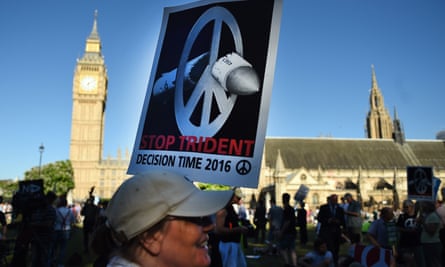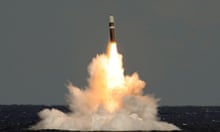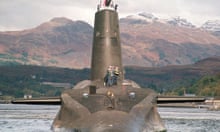Theresa May has said she would be willing to authorise a nuclear strike that could kill 100,000 people, as the House of Commons voted overwhelming to replace Britain’s Trident programme.
The prime minister confirmed she would be prepared to press the nuclear button if necessary as she opened a debate about whether the UK should spend up to £40bn replacing four submarines that carry nuclear warheads.
After more than five hours of discussion, parliament voted in favour of Trident renewal by a majority of 355 in a motion was backed by almost the entire Conservative party and more than half of Labour MPs.
It was opposed by all Scottish National party MPs, the Lib Dems and Labour leader, Jeremy Corbyn, a lifelong unilateralist who spoke out strongly against the plans during the deabte.
Other members of Corbyn’s frontbench team, including the shadow defence secretary, Clive Lewis, and the shadow foreign affairs secretary, Emily Thornberry, abstained after claiming in a Guardian article that the government was turning an issue of “national security into a political game”.
However, around 140 of his MPs - including leadership challengers Angela Eagle and Owen Smith voted in favour of renewing Trident, with many highlighting Labour’s historic position in support of a continuous at-sea nuclear deterrent. Forty-seven Labour MPs joined Corbyn in voting against Trident, while another 41 were absent or abstained.
While Labour were split on the issue, the Conservatives have been hoping the Trident issue could help unify their party after a fractious EU referendum campaign.
However, May attracted gasps during the debate when she made clear she would be willing to authorise a nuclear strike killing 100,000 people, when challenged by the Scottish National party about whether she would ever approve a nuclear hit causing mass loss of life.
Intervening in her opening speech, the SNP MP George Kerevan, asked: “Is she personally prepared to authorise a nuclear strike that can kill a hundred thousand innocent men, women and children?”
May responded: “Yes. And I have to say to the honourable gentleman the whole point of a deterrent is that our enemies need to know that we would be prepared to use it, unlike some suggestions that we could have a deterrent but not actually be willing to use it, which seem to come from the Labour party frontbench.”
Corbyn, the Labour leader, responded to May by making the case for nuclear disarmament, pointing out that the party’s pro-Trident position was under review.
He gave his MPs a free vote during Labour’s ongoing defence review, which the Guardian understands involves at least five options ranging from complete replacement to disarmament by the 2030s. The three other options are reduced patrols and fewer submarines, missiles carried by aircraft, and adapted submarines to carry both conventional and nuclear warheads.
Speaking in the Commons, Corbyn said there were currently 40 warheads, which are each eight times as powerful at the atomic bomb that killed 140,000 people at Hiroshima in Japan in 1945.
“What is the threat we are facing that one million people’s deaths would actually deter?” he said, adding it did not stop Islamic State, Saddam Hussein’s atrocities, war crimes in the Balkans or genocide in Rwanda.

“I make it clear today I would not take a decision that kills millions of innocent people,” Corbyn told MPs. “I do not believe the threat of mass murder is a legitimate way to deal with international relations.”
In contrast, May said it would be a “dereliction of duty” to give up Britain’s nuclear deterrent and pledged to keep to the Nato target of spending 2% of national income on defence while she is prime minister.
Addressing the idea of downgrading the deterrent to a cheaper option, she said: “I am not prepared to settle for something that does not do the job.”
May also took a swipe at anti-Trident MPs on the Labour frontbench and the Green MP Caroline Lucas, claiming they were therefore among “the first to defend the country’s enemies”.
The cost of Trident renewal has been estimated at more than £40bn. “No credible deterrent is cheap,” said May.
While the vast majority of Conservatives are in favour of renewing Trident, the Labour party is split three ways between those voting in favour, against and abstaining, while the SNP is firmly against.
Corbyn said the UK should follow other countries such as South Africa, Libya, Ukraine, Argentina, Brazil and Kazakhstan, which have shown they are serious about disarmament by giving up their nuclear programmes.
“It is now time to step up to the plate and move rapidly towards disarmament,” he said.
He was challenged by several Labour MPs as well as Conservatives. Jamie Reed, Copeland MP, claimed Corbyn was arguing against party policy.
“For the first time I think ever we’ve witnessed the leader of theLabour party stand up at the despatch box of this House and argue against the policy of the party he leads.
“This is unprecedented, moreover this reckless, juvenile, narcissistic irresponsibility makes me fearful for the future of the party that I love.”
Another Labour MP, John Woodcock, said it was an “indictment of how far this once great party has fallen” that it was having a free vote on the issue. He said it showed contempt for the public and Labour members, and said such a lack of direction would have been “abhorrent” to the former leader Michael Foot, who was a unilateralist.
On the other side, a number of Labour MPs, the SNP and one Tory MP, Crispin Blunt, all spoke out against Trident.
Brendan O’Hara, the SNP spokesman on defence in Westminster, said it was an “intolerable position” that nuclear warheads are kept in Faslane by a government the Scottish people did not elect.
Another SNP member, Chris Law, read out a harrowing account of a Hiroshima survivor talking about witnessing her schoolmates die.
“Some fell to the ground and their stomachs already expanded full, burst and organs fell out,” he said. “Others had skin falling off them and others still were carrying limbs. And one in particular was carrying their eyeballs in their hand.”
Blunt, the chair of the Commons foreign affairs committee, said it was a “colossal investment in a weapons system that will become increasingly vulnerable”.

“This weapons system comes at the cost of the rest of our defence budget,” said Blunt, while criticising his own party for making it into a “political weapon” aimed at Labour.
Corbyn’s anti-Trident position chimes with the views of Labour members surveyed on the issue but has caused tensions within the parliamentary party and with the trade unions.
Tim Roache, head of the GMB trade union, called on Corbyn to abide by Labour party policy endorsing Trident renewal, and said 45,000 jobs around the country were dependent on the programme going ahead.
Roache, who supported Corbyn as leader, told BBC Radio 4’s The World at One: “The Labour party have a clear policy. The clear policy is that Labour will uphold an at-sea deterrent.
“I would expect therefore all Labour MPs, including the leader of the Labour party – in fact, especially the leader of the Labour party – to uphold that current policy.”
He said he would be balloting the GMB’s 640,000 members on whether they believed Corbyn was still the right person to lead the party.
On the same programme, Tom Watson, the deputy Labour leader, warned of “consequences” for trade union bosses who continue to back Corbyn.
“You have Len McCluskey [of Unite] strongly supporting Jeremy Corbyn, who will be voting against the Trident programme tonight, which will put many defence workers in Unite out of their jobs if he gets his way,” said Watson.
“If I was a defence worker in Unite and I was reading social media that Unite were about to give Jeremy Corbyn a quarter of a million pounds of my subscriptions, I would be furious.”







Comments (…)
Sign in or create your Guardian account to join the discussion